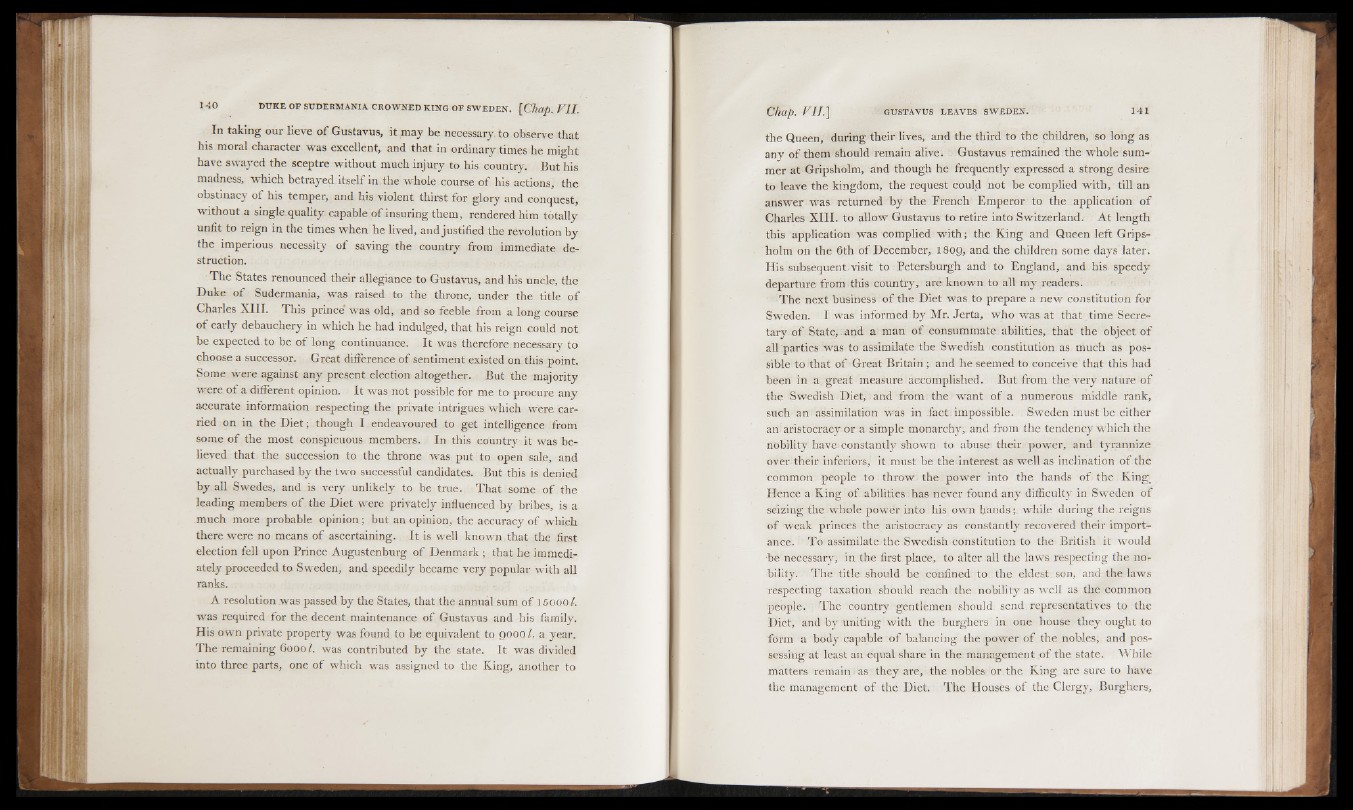
In taking our lieve of Gustavus, it may be necessary, to observe that
his moral character was excellent, and that in ordinary times he might
have swayed the sceptre without much injury to his country. But his
madness, which betrayed itself in. the whole course of his actions, the
obstinacy of his temper, and his violent thirst for glory and conquest,
without a single quality capable o f insuring them, rendered him totally
unfit to reign in the times when he lived, and justified the revolution by
the imperious necessity of saving the country from immediate destruction.
The States renounced their allegiance to Gustavus, and his uncle, the
Duke o f Sudermania, was raised to the throne, under the title o f
Charles XIII. This prince’ was old, and so feeble from a long course
o f early debauchery in which he had indulged, that his reign could not
be expected to be of long continuance. It was therefore, necessary to
choose a successor. Great difference o f sentiment existed on this ,point.
Some were against any present election altogether. But the majority
were, of a different opinion. It was not possible for me to procure any
accurate information respecting the private intrigues which were carried
on in the Diet; though I endeavoured to get intelligence from
some o f the most conspicuous members. In this country it was believed
that the succession to the throne was put to open sale, and
actually purchased by the two successful candidates. But this is denied
by all Swedes, and is very unlikely to be true. That some o f the
leading members o f the Diet were privately influenced by bribes, is a
much more probable opinion; but an opinion, the accuracy of which
there were no means of ascertaining. It is well known that the first
election fell upon Prince Augustenburg o f Denmark; that he immediately
proceeded to Sweden, and speedily became very popular with all
ranks.
A resolution was passed by the States, that the annual sum o f \5oool.
was required for the decent maintenance o f Gustavus and his family.
His own private property was found to be equivalent to 90001, a year.
The remaining 60001, was contributed by the state. It was divided
into three parts, one of which was assigned to the King, another to
the Queen, during their lives, and the third to the children, so long as
any of them should remain alive. Gustavus remained the whole summer
at Gripsholm, and though he frequently expressed a strong desire
to leave the kingdom, the request could not be complied with, till an
answer was returned by the French Emperor to the application of
Charles XIII. to allow Gustavus to retire into Switzerland. At length
this application was complied with; the King and Queen left Gripsholm
on the 6th of December, I809, and. the children some days later.
His subsequent, visit to Petersburgh and to England, and his. speedy
departure from this country, are known to all my readers.
The next business of the Diet was to prepare a new constitution for
Sweden. I was informed by Mr. Jerta, who was at that time Secretary
of State, and a man of consummate, abilities, that the object of
all parties was to assimilate the Swedish constitution as. much as possible
to ¡that of Great Britain ; and he seemed to conceive that this had
been in a great measure accomplished. But from the very nature of
the Swedish Diet, ¡and from: the want o f a numerous middle rank,
such an assimilation was in fact : impossible. Sweden must be either
an aristocracy:or a simple monarchy, and from the tendency which the
nobility have: constantly shown to abuse their power, and tyrannize
over their inferiors, it must be the interest as well as inclination of the
common, people to . throw the power into the hands of the King_
Hence a King o f abilities, has never found any difficulty in Sweden of
seizing the whole power into his own hands;, while during the reigns
of weak princes the aristocracy as constantly recovered their importance.
To assimilate the Swedish constitution to the British it would
be necessary; in the first place, to alter all the laws respecting the nobility.
The title: should he confined to the eldest son, and the laws
respecting taxation should reach the nobility as well as the common
people. The country gentlemen should send, representatives to the
Diet, and by uniting with the burghers in one house they ought to
form a body capable o f balancing the power of the nobles, and possessing
at least an equal share in the management of the state. While
matters remain; as they are, the nobles or the King are sure to have
the management of the Diet. The Houses of the Clergy, Burghers;